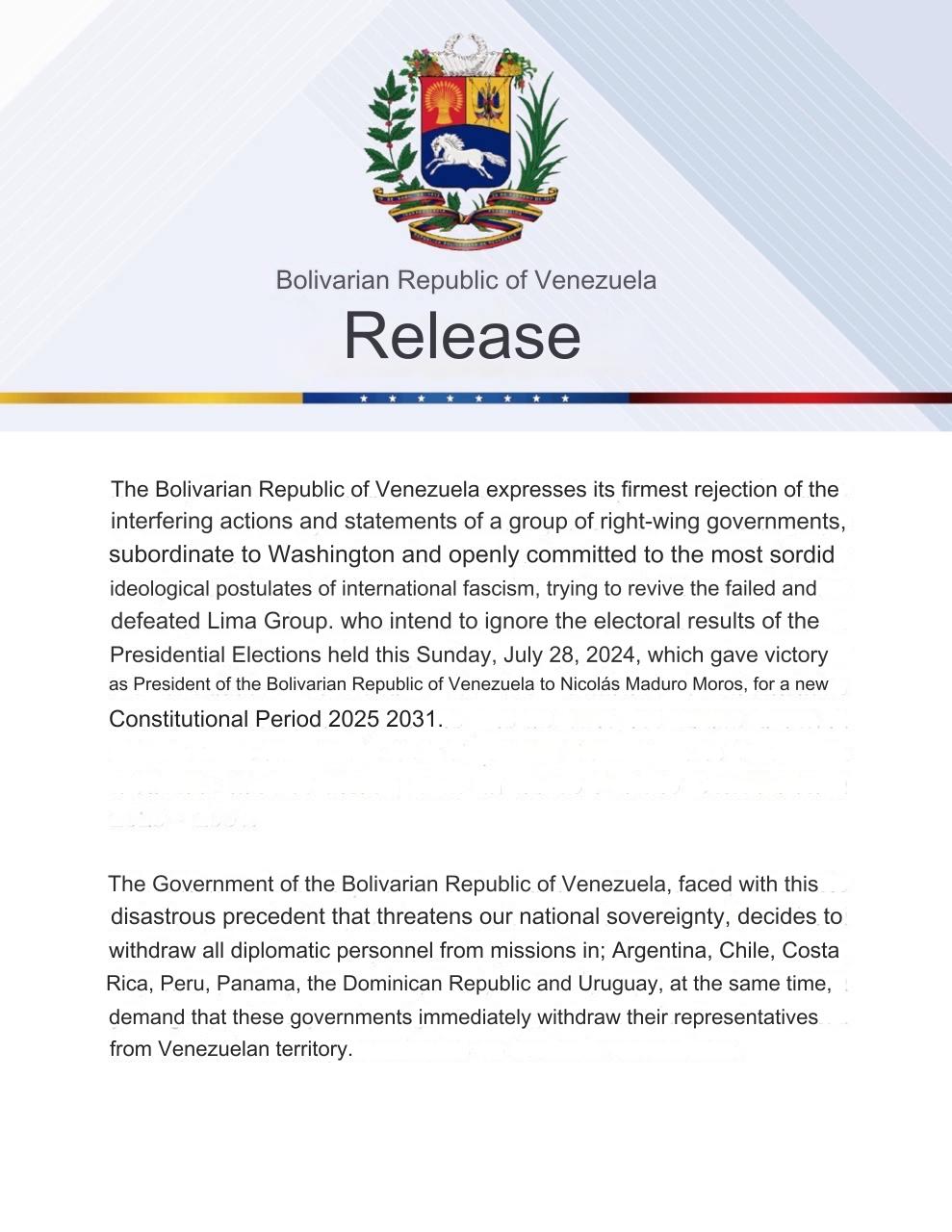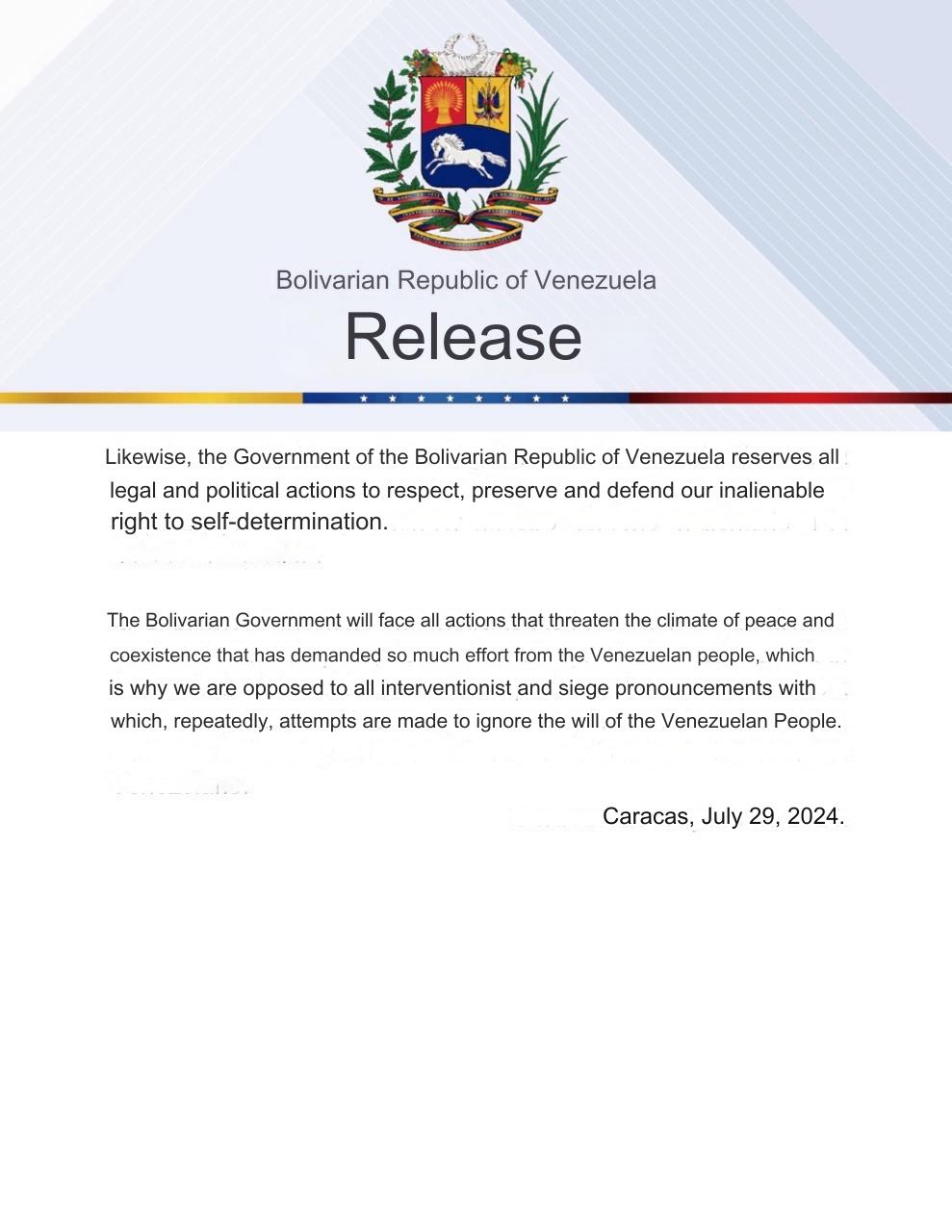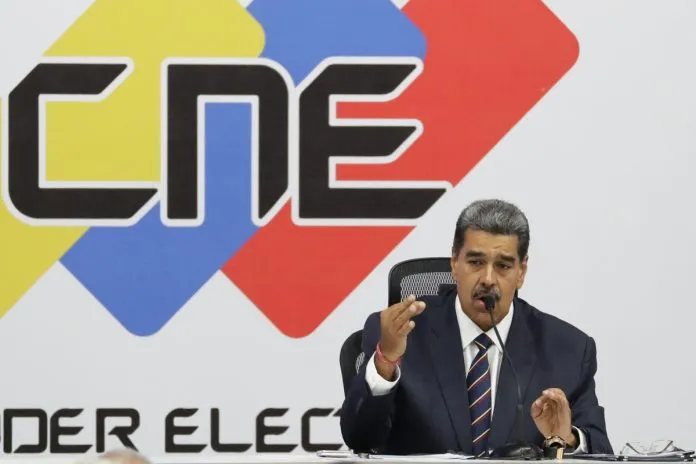Introduction
In a dramatic escalation of diplomatic tensions, Venezuelan President Nicolás Maduro has announced the severance of diplomatic relations with seven Latin American countries and the expulsion of their representatives from Venezuela. This bold move follows international criticism of the recent presidential election, which has been marred by controversy and allegations of irregularities. The Venezuelan government’s decision reflects its stance on maintaining national sovereignty amidst rising international scrutiny.
The Diplomatic Dispute
Maduro’s Official Announcement
On Monday, July 29, 2024, the Venezuelan government, led by Nicolás Maduro, issued a formal demand for Argentina, Chile, Costa Rica, Peru, Panama, the Dominican Republic, and Uruguay to withdraw their diplomatic representatives from Venezuelan soil immediately. This decision comes in response to what Maduro’s administration describes as “interventionist actions and statements” from these countries regarding the presidential election held on July 28.
In an official statement, the Venezuelan government articulated its “strongest rejection” of what it perceives as interference by these nations. The administration accused these governments of being “subordinated to Washington” and aligning themselves with what it calls “the most sordid ideological postulates of international fascism.” The Venezuelan government claims these actions are an attempt to undermine the legitimacy of the election results.
#Comunicado 📢 Venezuela expresa su más firme rechazo ante las injerencistas acciones y declaraciones de un grupo de gobiernos de derecha, subordinados a Washington y comprometidos abiertamente con los más sórdidos postulados ideológicos del fascismo internacional, tratando… pic.twitter.com/l0dAaNSnEA
— Yvan Gil (@yvangil) July 29, 2024


Diplomatic Retaliation
In retaliation, the Venezuelan government has decided to withdraw all diplomatic personnel from these seven countries. This move is part of a broader strategy to assert Venezuela’s sovereignty and defend its right to self-determination against what it views as foreign meddling. The official communiqué from the Venezuelan government also mentioned that it would take all necessary legal and political actions to preserve and defend its national interests.
Election Results and Controversy
The Official Election Outcome
The controversy stems from the results of the presidential election held on July 28, 2024. According to the National Electoral Council (CNE), Nicolás Maduro won the election with 51.2% of the vote. This announcement came after the CNE reported that 80% of the ballots had been counted, with more than two million votes still unaccounted for.
The opposition candidate, Edmundo González Urrutia, received 44.2% of the votes according to the CNE’s first and only public report. The incomplete tally of over two million votes, coupled with the lack of detailed breakdowns, has fueled skepticism and criticism from both domestic and international observers.
International Reactions
In response to the election results and the perceived irregularities, several Latin American countries, including Uruguay, Argentina, Costa Rica, Ecuador, Guatemala, Panama, Paraguay, Peru, and the Dominican Republic, have expressed profound concern. These nations have called for a thorough review of the election results and have requested an urgent meeting of the Organization of American States (OAS) to address the situation.
The international community’s reaction underscores the broader implications of the election and the challenges faced by the Venezuelan government in navigating its diplomatic relations amidst allegations of electoral malpractice.
The Broader Implications
Impact on Venezuela’s International Relations
The severance of diplomatic relations with these seven countries marks a significant shift in Venezuela’s international relations. The expulsion of diplomats and the withdrawal of Venezuelan diplomatic staff from these nations reflect heightened tensions and a more insular approach by the Venezuelan government.
This diplomatic rift may have far-reaching consequences for Venezuela’s foreign policy and its interactions with the international community. The response from other countries and international organizations will be crucial in determining the future trajectory of Venezuela’s diplomatic and political landscape.
Domestic and International Repercussions
The decision to sever ties and expel diplomats is likely to have both domestic and international repercussions. Domestically, it may consolidate Maduro’s position among his supporters by portraying him as a defender of national sovereignty against foreign interference. However, it could also exacerbate existing tensions and challenges within Venezuela.
Internationally, the diplomatic fallout may lead to increased isolation of Venezuela on the global stage. The ongoing scrutiny and criticism from the international community could impact Venezuela’s economic and political relationships, further complicating its position in regional and global affairs.
Conclusion
The Venezuelan government’s decision to sever diplomatic relations with seven Latin American countries and demand the withdrawal of their representatives represents a significant escalation in the country’s diplomatic tensions. This move is a direct response to international criticism of the recent presidential election, which has been plagued by controversy and allegations of irregularities.
As Venezuela navigates this turbulent period, the implications of these actions will unfold on both domestic and international fronts. The response from the global community, along with the ongoing scrutiny of Venezuela’s electoral processes, will play a crucial role in shaping the future of the country’s political and diplomatic landscape.


